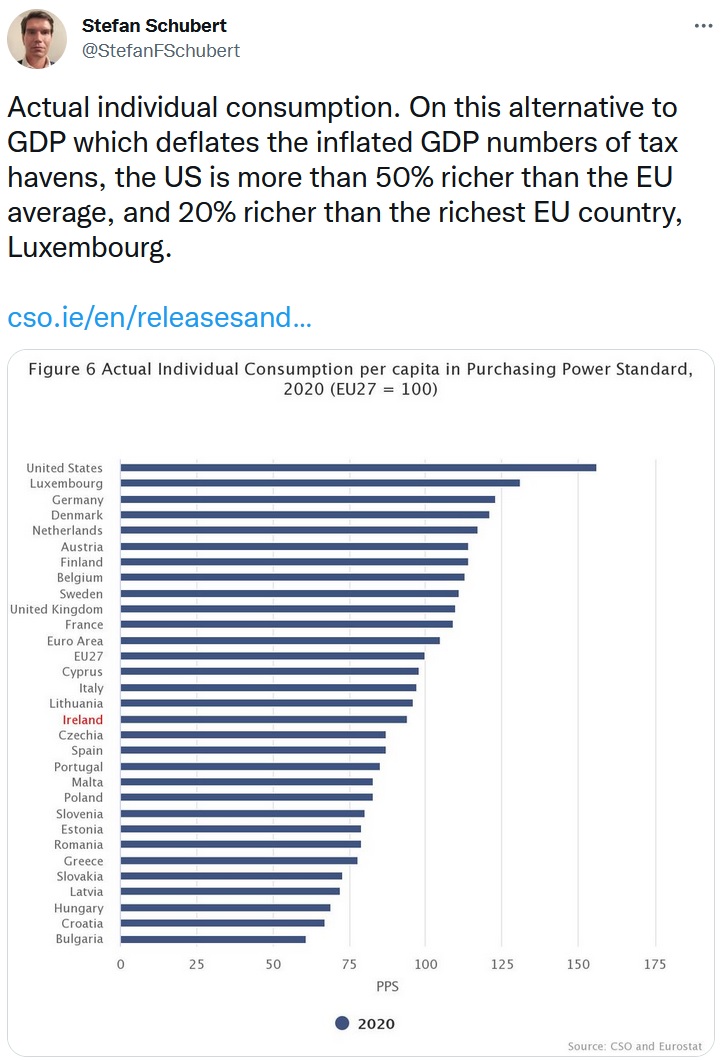–
It Makes No Sense to Copy European Fiscal Policy
The big fiscal debate in the United States is whether the United States should become a European-style welfare state, which is something that automatically will happen over the next few decades in the absence of genuine entitlement reform.
 Some people even want to accelerate this process.
Some people even want to accelerate this process.
My response is usually to ask why the United States should copy Europe when there is a wealth of evidence that living standards are substantially lower on that side of the Atlantic Ocean.
Not only are living standards lower, but there is also lots of evidence that Europe is suffering from anemic growth.
Which means the gap in living standards is getting wider every year.
At the risk of understatement, copying European fiscal policy seems like a big mistake.
If you’re still not convinced, here’s some more evidence. In his column for the U.K.-based Financial Times, Gideon Rachman compares the U.S. economy to what’s happening in Europe.
The US economy is now considerably richer and more dynamic than the EU or Britain — and the gap is growing. …In 2008, the EU and the US economies were roughly the same size. But since the global financial crisis, their economic fortunes have dramatically diverged.
As Jeremy Shapiro and Jana Puglierin of the European Council on Foreign Relations point out: “In 2008 the EU’s economy was somewhat larger than America’s: $16.2tn versus $14.7tn. By 2022, the US economy had grown to $25tn, whereas the EU and the UK together had only reached $19.8tn. America’s economy is now nearly one-third bigger. It is more than 50 per cent larger than the EU without the UK.” …Europe may never summon the will to reverse its inexorable decline in power, influence and wealth.
To address the final point in the above excerpt, we know the policies that would enable a European economic renaissance.
But don’t hold your breath waiting for that to happen.
There are some European nations with reasonably good overall economic policy, but only Switzerland has a good track record with regards to fiscal policy.
And all the recent evidence suggests that most European nations are increasing the fiscal burden of government (and overall economic policy also is becoming more dirigiste).
P.S. If you want to read the article Rachman cited from the European Council on Foreign Relations, click here.
P.P.S. Even better than Switzerland, European nations could copy Monaco.
17 Reasons the large national debt is a big deal!!!
We got to stop spending so much money and start paying off our national debt or the future of our children and grandchildren will be very sad indeed. Everyone knows that entitlement spending must be cut but it seems we are not brave enough to do it. I have contacted my Congressmen and Senators over and over but nothing is getting done!!! At least there are 66 conservative Republicans in the House that have stood up and voted against raising the debt ceiling.
June 17, 2013 at 7:13 am
Remember the debt? That $17 trillion problem? Some in Washington seem to think it’s gone away.
The Washington Post reported that “the national debt is no longer growing out of control.” Lawmakers and liberal inside-the-Beltway organizations are floating the notion that it’s not a high priority any more.
We beg to differ, so we came up with 17 reasons that $17 trillion in debt is still a big, bad deal.
1. $53,769 – Your share of the national debt.
As Washington continues to spend more than it can afford, every American will be on the hook for this massive debt burden.
SHARE this graphic.
2. Personal income will be lower.
The skyrocketing debt could cause families to lose up to $11,000 on their income every year. That’s enough to send the kids to a state college or move to a nicer neighborhood.
3. Fewer jobs and lower salaries.
High government spending with no accountability eliminates opportunities for career advancement, paralyzes job creation, and lowers wages and salaries.
4. Higher interest rates.
Some families and businesses won’t be able to borrow money because of high interest rates on mortgages, car loans, and more – the dream of starting a business could be out of reach.
5. High debt and high spending won’t help the economy.
Journalists should check with both sides before committing pen to paper, especially those at respectable outlets like The Washington Post and The New York Times. A $17 trillion debt only hurts the economy.
6. What economic growth?
High-debt economies similar to America’s current state grew by one-third less than their low-debt counterparts.
7. Eventually, someone has to pay the nation’s $17 trillion credit card bill, and Washington has nominated your family.
It’s wildly irresponsible to never reduce expenses, yet Washington continues to spend, refusing to acknowledge the repercussions.
>>>Watch this video to see how scary $17 trillion really is for your family.
8. Jeopardizes the stability of Medicare, Social Security, and Medicaid.
Millions of people depend on Medicare, Medicaid, and Social Security, but these programs are also the main drivers of the growing debt. Congress has yet to take the steps needed to make these programs affordable and sustainable to preserve benefits for those who need them the most.
9. Washington collects a lot, and then spends a ton. Where are your tax dollars going?
In 2012, Washington collected $2.4 trillion in taxes—more than $20,000 per household. But it wasn’t enough for Washington’s spending habits. The federal government actually spent $3.5 trillion.
>>> Reality check: See where your tax dollars really went.
10. Young people face a diminished future.
College students from all over the country got together in February at a “Millennial Meetup” to talk about how the national debt impacts their generation.
>>>Shorter version: They’re not happy. Watch now.
11. Without cutting spending and reducing the debt, big-government corruption and special interests only get bigger.
The national debt is an uphill battle in a city where politicians too often refuse to relinquish power, to the detriment of America.
12. Harmful effects are permanent.
Astronomical debt lowers incomes and well-being permanently, not just temporarily. A one-time major increase in government debt is typically a permanent addition, and the dragging effects on the economy are long-lasting.
13. The biggest threat to U.S. security.
Even President Obama’s former Chairman of the Joint Chiefs of Staff thinks so:
SHARE this graphic.
14. Makes us more vulnerable to the next economic crisis.
According to the Congressional Budget Office’s 2012 Long-Term Budget Outlook, “growing federal debt also would increase the probability of a sudden fiscal crisis.”
15. Washington racked up $300 billion in more debt in less than four months.
Our nation is on a dangerous fiscal course, and it’s time for lawmakers to steer us out of the coming debt storm.
16. High debt makes America weaker.
Even Britain’s Liam Fox warns America: Fix the debt problem now, or suffer the consequences of less power on the world stage.
17. High debt crowds out the valuable functions of government.
By disregarding the limits on government in the Constitution, Congress thwarts the foundation of our freedoms.
Read the Morning Bell and more en español every day at Heritage Libertad.
Related posts:
Let’s spend someone else’s money to solve our problems!!! That is the number one reason we have a national debt so high!!!
“The credit of the United States ‘is not a bargaining chip,’ Obama said on 1-14-13. However, President Obama keeps getting our country’s credit rating downgraded as he raises the debt ceiling higher and higher!!!! Washington Could Learn a Lot from a Drug Addict Just spend more, don’t know how to cut!!! Really!!! That is not […]
New Video shows how Obama has run up the national debt
We got to stop all the red ink. New Video Is a Strong Indictment of Obama’s Dismal Record on Spending August 13, 2012 by Dan Mitchell The burden of federal spending in the United States was down to 18.2 percent of gross domestic product when Bill Clinton left office. But this progress didn’t last long. Thanks […]
In One Year, Spending on Interest on the National Debt Is Greater Than Funding for Most Programs
In One Year, Spending on Interest on the National Debt Is Greater Than Funding for Most Programs Everyone wants to know more about the budget and here is some key information with a chart from the Heritage Foundation and a video from the Cato Institute. In 2010, the U.S. spent more on interest on the national debt than […]
National Debt Set to Skyrocket
National Debt Set to Skyrocket Everyone wants to know more about the budget and here is some key information with a chart from the Heritage Foundation and a video from the Cato Institute. In the past, wars and the Great Depression contributed to rapid but temporary increases in the national debt. Over the next few decades, runaway spending […]
Each American’s Share of National Debt Is Growing
Each American’s Share of National Debt Is Growing Everyone wants to know more about the budget and here is some key information with a chart from the Heritage Foundation and a video from the Cato Institute. As Washington continues to spend more than it can afford, future generations of taxpayers will be on the hook for increasing levels […]
“Feedback Friday” Letter to White House generated form letter response (on spending and national debt) May 9, 2012 (part 6)
I have been writing President Obama letters and have not received a personal response yet. (He reads 10 letters a day personally and responds to each of them.) However, I did receive a form letter in the form of an email on May 9, 2012. I don’t know which letter of mine generated this response so I have […]
How can the Federal Reserve buy trillions dollars of our national debt without any money?
Uploaded by PBS on Jan 4, 2008 Thousands of media outlets descended on Iowa, erecting a powerful wall of TV cameras and reporters between the voters and candidates. Bill Moyers talks with Ron Paul who knows well the power of the press to set expectations and transform the agenda. ____________________________ We should not be running […]
An open letter to President Obama (Part 58) “Our national debt threatens our security”
Liam Fox Issues a Warning to America Uploaded by HeritageFoundation on Feb 28, 2012 Britain’s Liam Fox has a warning for America: Fix the debt problem now or suffer the consequences of less power on the world stage. The former U.K. secretary of state for defense visited Heritage to explain why the America’s debt is […]
USA’s biggest defense problem is our national debt
Liam Fox Issues a Warning to America Uploaded by HeritageFoundation on Feb 28, 2012 Britain’s Liam Fox has a warning for America: Fix the debt problem now or suffer the consequences of less power on the world stage. The former U.K. secretary of state for defense visited Heritage to explain why the America’s debt is […]
Each American’s Share of National Debt Is Growing
Each American’s Share of National Debt Is Growing Everyone wants to know more about the budget and here is some key information with a chart from the Heritage Foundation and a video from the Cato Institute. As Washington continues to spend more than it can afford, future generations of taxpayers will be on the hook for increasing levels […]



